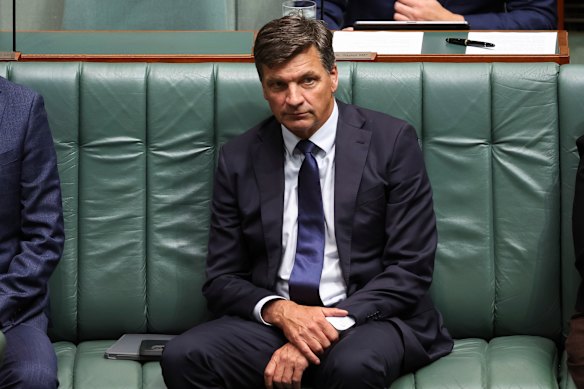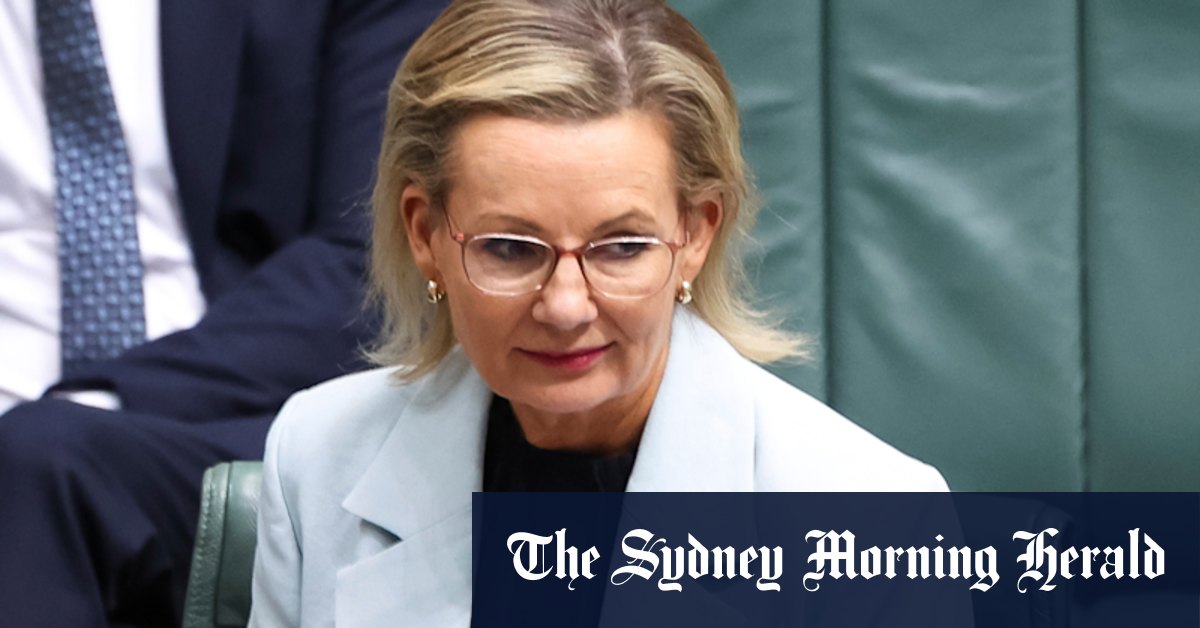Moderate Liberals, including Senator Dave Sharma, are openly canvassing the prospect of splitting with the Nationals, but if Ley dumps net zero, she would potentially stave off a right-wing challenge to her leadership in the early part of next year. Former Liberal MP Jason Falinski, a moderate, argued on ABC TV on Monday against a split.
Loading
If Ley follows through with dumping net zero, it would point to a calculation on her part that it is easier to call the moderates’ bluff on their threat to blow up the party than it would be to risk a challenge from her right flank.
MPs are not canvassing numbers for a leadership challenge, but a grim Newspoll published in The Australian on Monday, showing the Coalition primary vote at a record low of 24 per cent, has sparked private conversations about the leadership prospects of her deputy, Ted O’Brien, and right-wing challengers Angus Taylor and Andrew Hastie. Whoever took the leadership would take on the baggage of deposing the party’s first female leader, who inherited a weakened Coalition after the Peter Dutton-led election loss in May.
Taylor would be most likely to take over if Ley’s position became unsustainable this year, according to sources in both factions.
Hastie is viewed as a more likely contender if there was a leadership challenge next year after he has spent some time developing his support base and policy agenda.
Sources close to Hastie not authorised to speak publicly said that despite wanting to spend more time with family, he was increasingly determined to run for the leadership as early as next year. His supporters believe he has overtaken Taylor as the right’s preferred candidate, though Taylor is likely to draw more support from the moderates given he has espoused less contentious policy positions than Hastie since the election loss.

Opposition defence spokesman Angus Taylor.Credit: Alex Ellinghausen
Asked if Ley’s leadership was still tenable, South Australian MP Tony Pasin, who has consistently undermined Ley from the backbench, echoed former treasurer Scott Morrison’s famous remark in 2019 that he was “ambitious” for then-prime minister Malcolm Turnbull, days before Turnbull lost the job to Morrison.
“I’m ambitious for the Liberal Party to improve. It’s disappointing that the polls would suggest that we have gone backwards since the election, which in itself was a very bad outcome,” he said. “But I am not hearing colleagues whispering about leadership.”
NSW Senator Andrew Bragg said it was possible for the Liberals to finalise a policy that enabled the Coalition to continue. The Nationals have called to remove a net zero policy while remaining in the Paris Agreement, which is underpinned by net zero commitments from many nations. Bragg argued the Nationals’ intent to stay in Paris meant the parties could reconcile.
“My hope is that we can thread the needle on this over the next few weeks,” Bragg said.
Three other Liberals, who asked not to be named so they could speak freely, expressed disappointment in Ley’s performance and her handling of the net zero debate.
“She is now more unpopular with Australians than Peter Dutton was, even though she is not being attacked by Labor like he was,” one said.
A frontbench conservative MP said they had been impressed by the Nationals’ sales job on its proposal, which involved a slower renewables transition that retained a non-binding commitment to emissions cuts. “It was palatable and a lot of us think the Liberals can come quite close to that position,” the MP said.
Loading
Ley said on Monday: “I always said that the Nationals would come to their decision in their party room and the Liberals would similarly come to our decision in our party room. But our joint energy working group has done an incredibly sound job … and we can look forward to a Liberal Party energy position and then a coming together as a Coalition.”
The government’s commitment to net zero by 2050 includes setting five-yearly targets. In September, Labor announced a 2035 emissions-reduction target of 62-70 per cent on 2005 levels, to follow the plan for a 43 per cent cut in greenhouse gases by 2030.
Cut through the noise of federal politics with news, views and expert analysis. Subscribers can sign up to our weekly Inside Politics newsletter.

